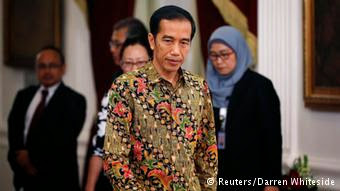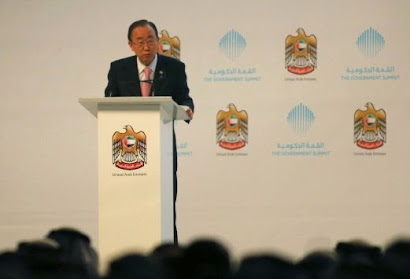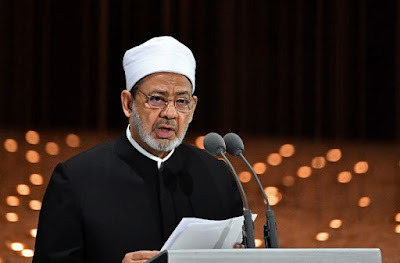 |
| Pope Francis is the first pontiff to visit Morocco since John Paul II in 1985 (AFP Photo/CIRO FUSCO) |
Rabat (AFP) - Pope Francis on Saturday joined Morocco's King Mohammed VI in saying Jerusalem should be a "symbol of peaceful coexistence" for Christians, Jews and Muslims, on the first day of a visit to the North African country.
The
spiritual leader of the world's 1.3 billion Catholics was invited by King
Mohammed VI for the sake of "interreligious dialogue", according to
Moroccan authorities.
In a joint
statement, the two leaders said Jerusalem was "common patrimony of
humanity and especially the followers of the three monotheistic
religions."
"The
specific multi-religious character, the spiritual dimension and the particular
cultural identity of Jerusalem... must be protected and promoted," they said
in the declaration released by the Vatican as the pontiff visited Rabat.
The
Moroccan king chairs a committee created by the Organisation of Islamic
Cooperation to safeguard and restore Jerusalem's religious, cultural and
architectural heritage.
The joint
statement came after US President Donald Trump's landmark recognition of the
disputed city as capital of Israel, which sparked anger across the Muslim
world, especially from Palestinians who see Jerusalem as the capital of their
future state.
Improving
relations with other religions has been a priority for the Argentine pontiff,
whose papacy has been marred by clergy facing a wave of child sex abuse
allegations.
Opposing extremism
 |
Thousands
of Moroccans greeted Pope Francis in the capital Rabat
(AFP Photo/Alberto
PIZZOLI)
|
Opposing extremism
Addressing
thousands of Moroccans who had braved the rain to attend the welcome ceremony,
Francis said it was "essential to oppose fanaticism".
He stressed
the need for "appropriate preparation of future religious guides",
ahead of meeting trainee imams later on Saturday.
Catholics
are a tiny minority Morocco, where 99 percent of the population is Muslim. The
king is revered across West Africa as "commander of the faithful".
Speaking at
the ceremony at the Tour (or tower) Hassan mosque and nearby mausoleum in
Rabat, the monarch also voiced opposition to radicalism.
"That
which terrorists have in common is not religion, it's precisely the ignorance
of religion. It's time that religion is no longer an alibi... for this
ignorance, for this intolerance," he said.
Francis
rode to the ceremony in his Popemobile, passing rows of Moroccan and Vatican
City flags and an estimated 12,000 well-wishers who packed the esplanade.
Buildings
had been repainted, lawns manicured and security stepped up ahead of the first papal
visit to Morocco since John Paul II in 1985.
A
17-year-old was arrested after trying to throw himself onto the king's
limousine to seek the monarch's help, the police said.
Some 130,000 people across Rabat watched the first stage of the pope's visit, which was beamed onto giant screens, officials said.
 |
Pope
Francis (L) was welcomed to Rabat by Morocco's King
Mohammed VI (AFP
Photo/Fadel SENNA)
|
Some 130,000 people across Rabat watched the first stage of the pope's visit, which was beamed onto giant screens, officials said.
'Right to
a future'
After
stopping by the royal palace, Francis and Mohammed visited an institute where
around 1,300 students are studying to become imams and preachers.
There they
heard from a French and a Nigerian student of the institute, which teaches
"moderate Islam" and is backed by the king.
In Morocco,
where Islam is the state religion, authorities are keen to stress the country's
"religious tolerance" which allows Christians and Jews to worship
freely.
But
Moroccans are automatically considered Muslim, apart from a minority who are
born Jewish. Apostasy is socially frowned upon, and proselytising is a criminal
offence.
Those who
try to "rock the faith of a Muslim or to convert him to another
religion" risk a prison term of up to three years.
After years
in the shadows, since 2017 the small number of converts have called openly for
the right to live "without persecution" and "without
discrimination".
 |
| The pope finished his Saturday schedule by meeting migrants (AFP Photo/ Alberto PIZZOLI) |
Around
30,000 to 35,000 Catholics live in Morocco, many of them from sub-Saharan
Africa.
The pope
finished his Saturday schedule by meeting migrants -- including children
dressed in colourful hats -- at a centre run by Catholic humanitarian
organisation Caritas.
"Everyone
has the right to a future," said Francis, who has throughout his papacy
highlighted the plight of migrants and refugees.
He
criticised "collective expulsions" and said ways for migrants to
regularise their status should be encouraged.
Caritas
centres in Rabat, Casablanca and Tangiers welcomed 7,551 new arrivals in 2017,
according to the charity, helping migrants access services.
The number
of people taking the sea route from Morocco to Spain has recently surged as it
has become harder for them to pass through Libya.
Rabat
claims to have a "humanistic" approach to migration and rejects
allegations by rights groups of "brutal arrest campaigns" and
"forced displacement" to the country's southern border.
On Sunday,
the pope will celebrate mass at a Rabat stadium with an estimated 10,000 people
attending.
Related Article:





















